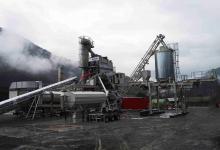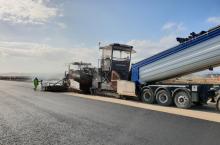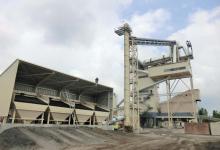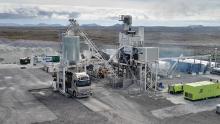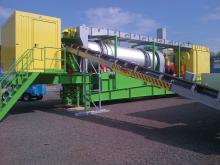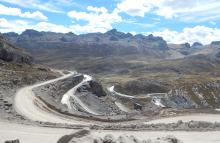A job site in the Southern African nation of Lesotho represents one of the most extreme and challenging projects to some key Italian firms of the last 10 years. The project was certainly different from the norm
It involves building a road in the Lesotho Mountains, some 200km from the capital Maseru, with the work being carried out by the Cooperative of Building and Cement workers from Ravenna (CMC).
CMC, which has ranked among Marini's clients for many years now, is involved in the construction of a
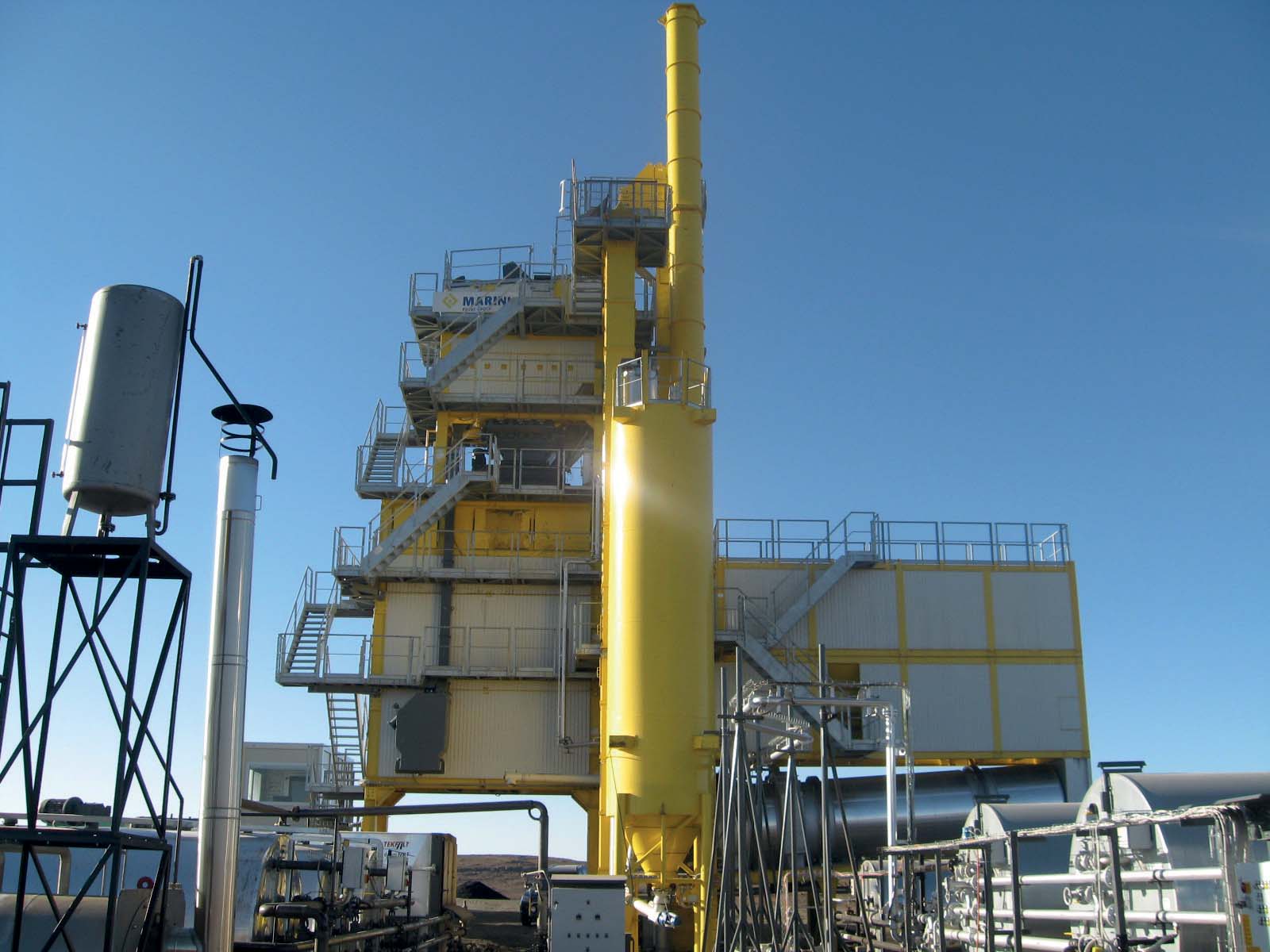
The asphalt plant has to operate in tough conditions at high altitude
RSSA job site in the Southern African nation of Lesotho represents one of the most extreme and challenging projects to some key Italian firms of the last 10 years. The project was certainly different from the norm
It involves building a road in the Lesotho Mountains, some 200km from the capital Maseru, with the work being carried out by the Cooperative of Building and Cement workers from Ravenna (CMC).
CMC, which has ranked among273 Marini's clients for many years now, is involved in the construction of a 45km stretch of mountain road. This difficult job site is set on the tourist route to Afriski, a ski resort at an altitude of over 3,000m in the mountains, home to winter sports lovers from all over the African continent. It is a steep, winding road also used by vehicles transporting diamonds extracted from the local mines. The conditions are extreme due to both the altitude and the location of the road. The stretch in question forms part of a long road network built over time throughout the country by various Italian constructors. Up to the height of 2,000-2,500m this well-built road has performed well. But above 2,500m it encounters weather conditions which can become very tough. The temperature range is wide, often passing from 25°C during peak times to -5°C within just a few hours. Ice formation and snowfalls mean that the road requires active maintenance and cleaning operations. However these are not always carried out with the necessary care and attention required to ensure long life. In just a few short years the snow ploughs have ripped up the asphalt and deteriorated the surface, which under other circumstances, with the right approach and equipment, would have lasted longer.
On first arrival the land seems to resemble a lunar landscape. When reaching a height of 2,000m, the tree line disappears and the land becomes barren and stony. Sometimes the winter brings snowfalls as deep as 2-3m, but even in the absence of snow, the winter months are mild only in appearance, with the temperatures constantly falling below -10°C. The CMC base is situated at 3,200m above sea level, on the road leading to the diamond mining district, barely 200m lower down from the mine entrance itself.
Just a few metres away is the ski station, well known throughout southern Africa, situated along a ridge which flanks a natural lake. “At the beginning of reconstruction work, we lived in lovely little wooden Tyrolean-style houses owned by the proprietors of the ski station,” said engineer Mauro Riccardi, plant manager of CMC Ravenna. “Then the ski season opened and we quickly concluded work at the base camp, before moving on to the nearest camp 60km further down the road.”
CMC is busy with the reconstruction work of its stretch of the road, which includes the demolition of the old pavement and the relaying of the new layers. This involves stabilising work, then 300mm of base on which 80-100mm mat is laid to ensure that the road offers sufficient grip. Because of the weather conditions, it is natural to use modified bitumen, resulting in easy laying operations and long-lasting road performance.
In Africa the tendency is to build thin asphalt mats on very long roads, and this was the reason why CMC initially steered itself towards a continuous mix plant. In normal conditions these are the smallest plants and the easiest to move when each section of road is completed and the worksite changes location. Unfortunately, the plant pinpointed for the job did not meet the challenge, because of the difficulties with production capacity at a high altitude and because the grading curve of the asphalt mix needed to be tightly controlled. Instead CMC considered a mobile batch plant: a small 80-90tonne/hour plant on two transportable trailers. But this plant had a small drum and at an altitude of 3,200m the productivity would decrease by 35-40%. Managing a burner when the oxygen supply is limited is not an easy task as the CMC technicians are well aware. Using such a plant at this great altitude provided challenges for handling the fumes as well as managing the yield. It seemed that the production would have to be reduced to such an extent as to prevent CMC finishing the job at the given time.
The need to use a different option was made all the more necessary when it turned out that the trailers were not homologated and would have had to be loaded onto other vehicles to be roadworthy. Negotiating the hairpin bends on the route would have been very difficult and plant mobility would have been a major issue.
Instead CMC decided to opt for another method, finding a solution when working on a job in Kenya. In one of the best preserved natural parks in the world CMC had been asked to impermeabilise a dam with a 500mm asphalt core. The area, on the edge of Lake Victoria, is a nature reserve with strict work regulations and special regard for ecology. So the idea was that, once the job was finished in Lesotho, the plant would have to be moved to Kenya to work on this strategic project for developing one of the most uncontaminated areas of the African continent.
Marini suggested that CMC use a new plant which would have no problem in fulfilling production requirements at high altitude, was easily transportable and had all the necessary ‘green’ technology of the latest generation Marini plants. As a result CMC selected an eTOWER 2000 E206, a plant with easy-to-move component parts fitted into a container. Once the transport expenses had been simplified and reduced, CMC then decided it could add a bigger filtering bar to the eTOWER 2000 to diminish the effects of the altitude on the production levels. The plant’s drum is a MARINI E206 fitted with the filter above the drying chamber, to deliver savings in both energy and site management.
The eTOWER is designed to work with all recent developments for producing warm asphalt based on the introduction of liquid or solid additives, on the production of foam bitumen or specific cycles for use with RAP. This plant could also deliver CMC’s needs to use a bitumen additive, a fluxing agent which allows work at -8°C.
On this site even the fuel supply is complex. Bitumen transport tanks cannot negotiate the tight bends in the road leading to the plant, and so the bitumen has to be supplied in drums, with all the difficulties that such a situation can bring.
CMC has fitted the plant with a melting chamber for the bitumen in drums and with a plant to modify the bitumen supplied by Marini’s Turkish branch.
On the site at 3,200m above sea level, there are 15 Italian personnel presently organising the local team, which fluctuates from 100-150 workers, depending on the different stages of work and the weather conditions. CMC is relying on this plant to produce 150tonnes/hour at a height of over 3,000m. This is in spite of the plant featuring a medium size storage bin, which means making the most out of the working day, and completing the job within the time schedule.
LiuGong wins Eritrean contract
269 LiuGong has won a major Eritrean government procurement programme contract to supply a wide variety of its earthmoving machines for construction projects in the country.
Located in north-east Africa, Eritrea has maintained a good trade relationship with China for some years. LiuGong started cooperation with the Eritrean government procurement agent in 2010 and the latest procurement contract is the third it has secured for the same source, with the previous two being in 2011 and 2013. The procurement programme contract includes a total of 72 machines, including wheeled loaders, excavators, motor graders and3420 Dressta bulldozers.
All the equipment is being delivered to Eritrea from Shanghai and distributed across Eritrea. “The bidding has once again proved that LiuGong could provide our customers with not only a full line of high-quality construction equipment but also total solutions that could satisfy customers’ application needs in the world,” Yu Chuanfen, president of LiuGong, said.
RSS
It involves building a road in the Lesotho Mountains, some 200km from the capital Maseru, with the work being carried out by the Cooperative of Building and Cement workers from Ravenna (CMC).
CMC, which has ranked among
On first arrival the land seems to resemble a lunar landscape. When reaching a height of 2,000m, the tree line disappears and the land becomes barren and stony. Sometimes the winter brings snowfalls as deep as 2-3m, but even in the absence of snow, the winter months are mild only in appearance, with the temperatures constantly falling below -10°C. The CMC base is situated at 3,200m above sea level, on the road leading to the diamond mining district, barely 200m lower down from the mine entrance itself.
Just a few metres away is the ski station, well known throughout southern Africa, situated along a ridge which flanks a natural lake. “At the beginning of reconstruction work, we lived in lovely little wooden Tyrolean-style houses owned by the proprietors of the ski station,” said engineer Mauro Riccardi, plant manager of CMC Ravenna. “Then the ski season opened and we quickly concluded work at the base camp, before moving on to the nearest camp 60km further down the road.”
CMC is busy with the reconstruction work of its stretch of the road, which includes the demolition of the old pavement and the relaying of the new layers. This involves stabilising work, then 300mm of base on which 80-100mm mat is laid to ensure that the road offers sufficient grip. Because of the weather conditions, it is natural to use modified bitumen, resulting in easy laying operations and long-lasting road performance.
In Africa the tendency is to build thin asphalt mats on very long roads, and this was the reason why CMC initially steered itself towards a continuous mix plant. In normal conditions these are the smallest plants and the easiest to move when each section of road is completed and the worksite changes location. Unfortunately, the plant pinpointed for the job did not meet the challenge, because of the difficulties with production capacity at a high altitude and because the grading curve of the asphalt mix needed to be tightly controlled. Instead CMC considered a mobile batch plant: a small 80-90tonne/hour plant on two transportable trailers. But this plant had a small drum and at an altitude of 3,200m the productivity would decrease by 35-40%. Managing a burner when the oxygen supply is limited is not an easy task as the CMC technicians are well aware. Using such a plant at this great altitude provided challenges for handling the fumes as well as managing the yield. It seemed that the production would have to be reduced to such an extent as to prevent CMC finishing the job at the given time.
The need to use a different option was made all the more necessary when it turned out that the trailers were not homologated and would have had to be loaded onto other vehicles to be roadworthy. Negotiating the hairpin bends on the route would have been very difficult and plant mobility would have been a major issue.
Instead CMC decided to opt for another method, finding a solution when working on a job in Kenya. In one of the best preserved natural parks in the world CMC had been asked to impermeabilise a dam with a 500mm asphalt core. The area, on the edge of Lake Victoria, is a nature reserve with strict work regulations and special regard for ecology. So the idea was that, once the job was finished in Lesotho, the plant would have to be moved to Kenya to work on this strategic project for developing one of the most uncontaminated areas of the African continent.
Marini suggested that CMC use a new plant which would have no problem in fulfilling production requirements at high altitude, was easily transportable and had all the necessary ‘green’ technology of the latest generation Marini plants. As a result CMC selected an eTOWER 2000 E206, a plant with easy-to-move component parts fitted into a container. Once the transport expenses had been simplified and reduced, CMC then decided it could add a bigger filtering bar to the eTOWER 2000 to diminish the effects of the altitude on the production levels. The plant’s drum is a MARINI E206 fitted with the filter above the drying chamber, to deliver savings in both energy and site management.
The eTOWER is designed to work with all recent developments for producing warm asphalt based on the introduction of liquid or solid additives, on the production of foam bitumen or specific cycles for use with RAP. This plant could also deliver CMC’s needs to use a bitumen additive, a fluxing agent which allows work at -8°C.
On this site even the fuel supply is complex. Bitumen transport tanks cannot negotiate the tight bends in the road leading to the plant, and so the bitumen has to be supplied in drums, with all the difficulties that such a situation can bring.
CMC has fitted the plant with a melting chamber for the bitumen in drums and with a plant to modify the bitumen supplied by Marini’s Turkish branch.
On the site at 3,200m above sea level, there are 15 Italian personnel presently organising the local team, which fluctuates from 100-150 workers, depending on the different stages of work and the weather conditions. CMC is relying on this plant to produce 150tonnes/hour at a height of over 3,000m. This is in spite of the plant featuring a medium size storage bin, which means making the most out of the working day, and completing the job within the time schedule.
LiuGong wins Eritrean contract
Located in north-east Africa, Eritrea has maintained a good trade relationship with China for some years. LiuGong started cooperation with the Eritrean government procurement agent in 2010 and the latest procurement contract is the third it has secured for the same source, with the previous two being in 2011 and 2013. The procurement programme contract includes a total of 72 machines, including wheeled loaders, excavators, motor graders and
All the equipment is being delivered to Eritrea from Shanghai and distributed across Eritrea. “The bidding has once again proved that LiuGong could provide our customers with not only a full line of high-quality construction equipment but also total solutions that could satisfy customers’ application needs in the world,” Yu Chuanfen, president of LiuGong, said.
RSS

